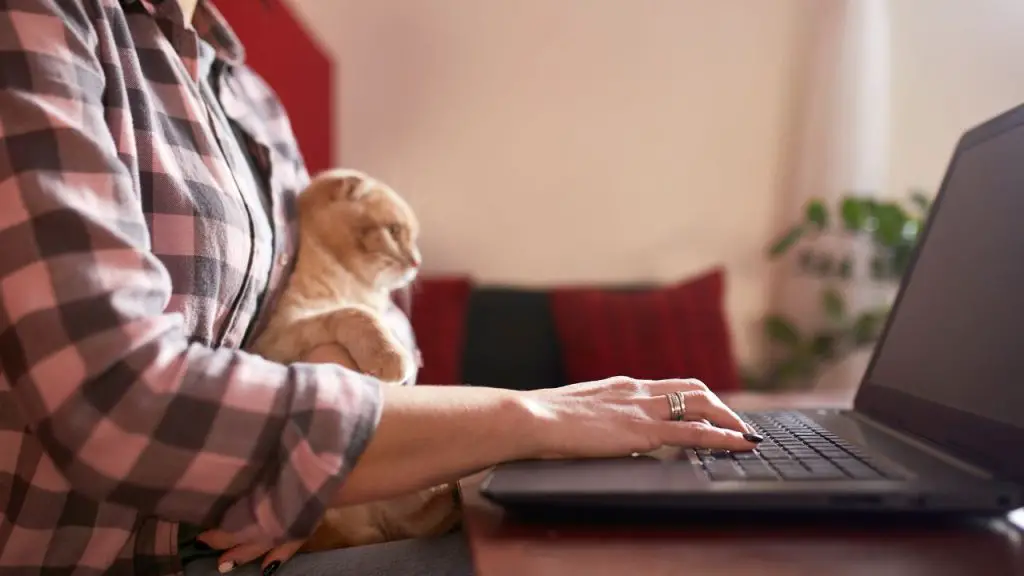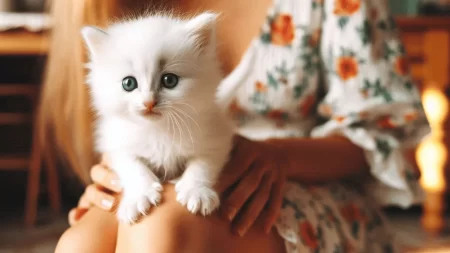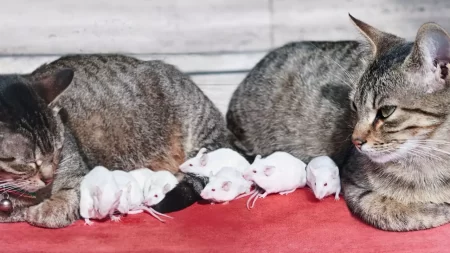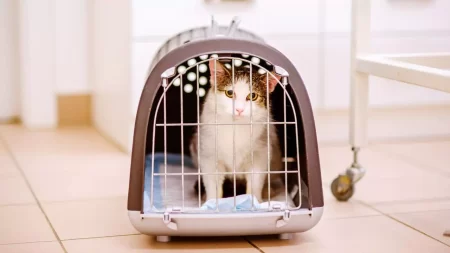Have you ever noticed your usually independent cat becoming overly attached and affectionate after returning home from a vacation? This behavior may seem sweet at first, but it can also become overwhelming and frustrating for both you and your feline friend. In this blog post, we’ll explore the possible reasons behind this clingy behavior, how to deal with it, and ways to prepare your cat for future vacations. Don’t let your needy cat stress you out – read on to find out more!
Understanding Clingy Cat Behavior After Vacation
Cats can become clingy after returning home from vacation due to a variety of reasons including separation anxiety, change in routine, stress, loneliness, fear, need for security, hormonal changes, associative learning, and different scents.
Separation Anxiety
As someone who loves cats, it’s important to understand separation anxiety as a common issue that can arise when you return from vacation. This condition is characterized by an excessive attachment to the owner, resulting in clingy behavior and vocalization upon their return. Cats may even follow their owners around more than usual or show signs of frustration when left alone.
It’s important to note that this type of behavior can be a sign of serious health concerns in cats”, such as urinary tract infections or other issues related to stress. If your cat becomes overly affectionate or clingy after returning home from vacation, it’s crucial to take them for a check-up with their veterinarian as soon as possible.
Change In Routine
As creatures of habit, cats thrive on routine. Any change in their daily routine can cause stress and anxiety for them, which is why returning home from vacation can trigger clingy behavior in cats. They may need some time to readjust to their owner’s presence and resume their normal routines.
During the absence of their owners, cats may have been looked after by a pet sitter or stayed at a pet hotel. The unfamiliar smells and sounds of these places could also make them feel anxious and insecure upon returning home. It is important for cat owners to be patient with their furry companions during this period of adjustment and provide reassurance that they are back for good.
Stress
When cats experience stress, they may become more clingy and needy. Stressful situations such as a change in routine or being left alone for an extended period can cause your cat to feel anxious and uncertain about their environment. This can lead them to seek out security and comfort from you.
It’s important to understand that prolonged stress can have negative impacts on your cat’s health, including behavioral problems and even physical illnesses. By providing reassurance, comfort, and a stable environment after returning from vacation or during periods of change, you can help reduce your cat’s stress levels and prevent excessive clinginess.
Remember to be patient with your feline friend as it takes time for them to adjust back into their normal routine. Seeking veterinary advice is recommended if the anxiety persists beyond the normal adjustment period or behavior issues arise.
Loneliness And Fear
When a cat’s owner is away on vacation, the change in routine can often result in feelings of loneliness and fear for their furry friend. This can prompt cats to become more clingy and affectionate once their owners return home. It is important for pet owners to show understanding and provide reassurance during this time as it could help alleviate any anxiety that the cat may be experiencing.
For some cats, being left alone can cause immense stress, especially if they are not used to being separated from their owner. In such cases, when their owner returns from vacation, the cats’ clinginess might be an effort to establish a sense of security and safety again. By spending quality time with your cat when you return home, and providing them with love and attention, you may reduce these feelings of loneliness and fear experienced by your pet.
Need For Security
I’ve noticed that one of the possible reasons for a cat’s clingy behavior after returning home from vacation is its need for security. Cats are creatures of habit and routine, so any disruption to their daily lives can be stressful for them. When their owners leave on vacation, they may perceive it as a threat to their safety and security.
As a result, when owners return home from vacation, cats can become overly affectionate as they seek reassurance and comfort. They may follow their owners around the house, meowing more than usual, or even demand attention by climbing onto laps or rubbing against their legs. Providing your cat with a stable and comfortable environment can help alleviate this stress and make them feel secure in their surroundings.
To give your cat an extra sense of security while you’re away on vacation, it’s important to find a trusted caregiver who will provide consistent care in your absence. This could be someone familiar like a friend or family member who knows your cat well, or a professional pet sitter who has experience handling cats with separation anxiety. By doing so, you’ll be able to enjoy peace of mind knowing that your furry friend is safe and secure until you return home.
Hormonal Changes
As female cats go through their natural hormonal cycles, it can affect their behavior and mood. This may be one of the reasons why some cats become clingy after returning home from a vacation. Hormones such as estrogen and progesterone can impact a cat’s desire for attention and affection, leading to increased clinginess.
Additionally, if a female cat was in heat or pregnant during her owner’s absence, this could also contribute to her clingy behavior upon return. It is important for owners to understand their cat’s hormonal cycle and provide them with the comfort and care they need during these times.
It is also worth noting that male cats may experience their own hormonal changes that could contribute to post-vacation clingy behavior. Testosterone levels fluctuate throughout a male cat’s life, which can impact its activity level and desire for attention. Owners should pay attention to any changes in behavior after a vacation and consult with their veterinarian if necessary.
Associative Learning
As cats are creatures of habit, they rely on routine and familiarity to feel secure. When their environment changes due to the absence of their owners or a new caregiver, it can trigger feelings of insecurity and anxiety. Associative learning occurs when cats associate their owner’s return from vacation with safety and security. This reaction is due to cats identifying the smell, sight, and sound of their owners as familiar and safe.
To help manage clingy cat behavior after returning from vacation, it’s important to understand how associative learning influences your cat’s behavior. Cats may follow you around or cuddle more excessively than usual because they believe that by doing so, they will gain some level of comfort or reassurance from you. Providing additional attention and affection can be helpful in reinforcing the idea that your cat is safe when you are present.
In conclusion, being aware of how cats form attachments based on associative learning can help alleviate stress for both pet parents and furry friends alike. By understanding this concept, we can better support our pets as they navigate changes in routine while ensuring they receive the love and attention needed to feel secure upon returning home from vacation.
Different Scents
As a cat owner, you may have noticed your furry friend sniffing around the house and investigating unusual scents after returning from vacation. Different smells can be confusing for cats who rely on familiar scents to feel safe and secure. A change in their environment or unfamiliar scents can cause stress and anxiety in some cats.
To help ease your cat’s stress upon returning home, it is important to introduce familiar smells back into their environment. This can include using the same cleaning products, leaving out familiar bedding or toys with their scent on them, and giving them access to areas they are used to spending time in. Providing your cat with comfort through scent can go a long way towards easing any separation anxiety they may be experiencing.
By being attentive to your cat’s behavior and taking steps to address any clinginess or discomfort after coming back from vacation, you can ensure that both you and your feline friend are happy and relaxed at home together once again.
Dealing With Clingy Cat Behavior
To help your cat adjust after returning from vacation, gradually reintroduce their routine, provide comfort and reassurance, use positive reinforcement, give them space and time, and seek veterinary advice if necessary. Read on to learn more about managing your clingy cat’s behavior after a vacation.
Gradually Reintroduce Routine
Have you ever returned from a relaxing vacation to find your beloved feline friend acting overly clingy and needy? It may seem like an adorable welcome home, but there could be underlying reasons for this kind of behavior. Cats can become anxious and stressed when their owners are away, causing them to crave extra attention upon their return.
In this blog post, we’ll explore the possible reasons why cats act clingy after returning from vacation and share some helpful tips on how to manage their behavior. So, if you’re a cat owner who wants to understand your furry friend’s post-vacation antics, read on!
Provide Comfort And Reassurance
When your cat becomes overly clingy after returning home from vacation, it’s essential to provide them with comfort and reassurance. This could mean giving them extra attention and affection or providing familiar toys and scents that they associate with you. It’s important to remember that your cat may be feeling lonely, scared or stressed – so try to alleviate their anxiety as best you can.
One way to reassure your clingy cat is by using positive reinforcement techniques like treats or gentle praise when they exhibit calm behavior. You can also provide a cozy hiding space for them to retreat and feel secure while adjusting back into their daily routine. Remember, patience is key when dealing with a needy feline friend, but reassuring them will not only make them feel better but increase the bond between you two.
Use Positive Reinforcement
When dealing with clingy cat behavior, positive reinforcement can be a powerful tool to encourage your furry friend to feel more secure and independent. Rewarding your cat’s good behavior with treats or toys can help them understand what is expected of them, while also providing mental and physical stimulation. For example, if your cat starts exploring their surroundings without meowing for attention, reward them with a treat or playtime.
Positive reinforcement should always be accompanied by plenty of affection and praise. When you notice that your cat is behaving well on their own, commend them verbally with compliments like “good job” or “you’re so smart.” This will not only reinforce desirable behavior but also strengthen the bond between you and your feline companion.
Give Them Space And Time
As a cat owner, sometimes you just need to give your feline friend some space and time. When they become overly clingy after returning home from vacation, it is important to set boundaries and allow them their own personal space. This is especially true if they are exhibiting signs of separation anxiety or stress.
Remember that cats need their alone time too, so don’t feel guilty about giving them some space. It may take a little time for them to readjust back into their normal routine, but try not to get frustrated with any clingy behaviors during this period. Patience and understanding will go a long way toward making your cat feel more secure and comfortable in its surroundings again.
Seek Veterinary Advice If Necessary
If your cat displays overly clingy or attention-seeking behavior after your return from vacation, it’s crucial to seek veterinary advice if necessary. In some cases, excessive attachment can be a sign of serious health concerns such as hyperthyroidism or kidney disease.
Your cat’s veterinarian may also recommend behavioral modification techniques, including providing a more secure environment and scheduling more playtime to alleviate separation anxiety. By seeking professional help, you can ensure that your furry friend receives the appropriate care and attention they need for optimal mental and physical well-being.
How To Prepare Your Cat For Your Next Vacation?
To ensure your cat is comfortable and happy while you’re away, it’s important to find a trusted caregiver, familiarize them with your cat, provide a comfortable environment, and leave familiar toys and scents – read on for more helpful tips!
Find A Trusted Caregiver
Finding a trusted caregiver is crucial when preparing for your next vacation. Look for someone with experience in cat care who you trust to take good care of your pet while you’re away. It’s also important to familiarize your cat with the caregiver before leaving so that they feel more comfortable and secure during their absence.
When choosing a caregiver, make sure to ask about their availability and their ability to provide food and water, clean litter boxes regularly, maintain the cat’s regular routine as closely as possible, and monitor any potential health issues. Consider leaving detailed instructions for feeding schedules, medication administration, and contact information for your veterinarian in case of an emergency. With proper preparation, finding a trusted caregiver can ease any anxiety associated with leaving your furry friend behind on vacation.
Familiarize Your Cat With The Caregiver
When preparing for your next vacation, it’s essential to find a trusted caregiver who will take care of your furry friend. However, it’s equally important to familiarize your cat with this person beforehand. You can start by introducing the caregiver during playtime or mealtime, so your cat associates them with positive experiences.
To help ease any anxiety or stress that your cat may feel in your absence, ensure that they have had previous interactions with the caregiver before you leave for vacation. This way, when you’re away, their presence won’t come as a surprise and will have become part of their daily routine.
Provide A Comfortable Environment
When preparing your cat for your next vacation, providing a comfortable environment is essential. This entails ensuring that the litter box, food, and water bowls are easily accessible and that there is plenty of space for your cat to roam around in. Additionally, consider leaving familiar toys and bedding with them to keep them calm when you’re away.
It’s also important to make sure their surroundings are safe from potential hazards such as chemicals or sharp objects they might accidentally ingest or injure themselves on. Keep furniture stable so it doesn’t topple over when they climb on it, and ensure any plants are non-toxic should they decide to chew on them. By providing a comfortable environment before leaving for vacation, you can help alleviate some of the anxiety your cat may experience while you’re away and make their transition back home easier upon your return.
Leave Familiar Toys And Scents
When preparing for your next vacation, it’s essential to consider how you can help ease your cat’s separation anxiety. One effective method is to leave familiar toys and scents around the house while you’re away. Familiar smells will provide comfort, while familiar toys will help distract them from missing you.
Placing blankets or clothing with your scent on them around the house is also a great way to create a sense of security and familiarity for your cat. Your scent can act as a calming presence and make them feel like you are still close by. By leaving familiar items behind, you’ll be making it easier for your cat to cope with your absence and reduce their stress levels.
How To Manage Your Cat’s Clingy Behavior?
To manage your cat’s clingy behavior, try giving them attention and affection, encouraging independent play and exploration, providing mental and physical stimulation, and using calming techniques as needed.
Give Them Attention And Affection
When cats become clingy after vacation, they may simply need more attention and affection from their owner. To help manage this behavior, it’s important to set aside dedicated time every day to play with and cuddle your cat. Providing plenty of physical touches and talking in a soothing voice can also help reassure them that you’re back home for good.
It’s important to note that even though clinginess can be frustrating at times, punishing your cat or ignoring them will only exacerbate the problem. Instead, try to provide positive reinforcement for good behavior by offering treats or praise when your cat plays independently or uses their scratching post instead of furniture. With patience and consistency, you can help reduce their neediness while still giving them the love they crave.
Encourage Independent Play And Exploration
As cat owners, we all want our furry companions to feel happy and content. One way to help manage clingy behavior is by encouraging independent play and exploration. Providing toys that stimulate your cat’s predatory instincts can help reduce boredom and give them an outlet for their energy.
Interactive toys like puzzles or balls with treats inside can also keep them occupied while you’re away. Adding a cat tree or post near a window can provide entertainment as they watch the world outside. By giving your cat opportunities for solo playtime, you’ll be helping them maintain their independence and keeping them entertained when you’re not around.
Provide Mental And Physical Stimulation
One way to help reduce clingy behavior in cats is by providing them with mental and physical stimulation. Toys that encourage play, such as interactive puzzles, can provide a fun and stimulating activity for your cat. It’s also important to give your cat opportunities for exercise, whether it’s through playtime or designated “cat-friendly” spaces in your home where they can climb and explore.
In addition to toys and exercise, you may consider setting up a regular routine of training or positive reinforcement. This can help keep your cat mentally stimulated while reinforcing good behaviors like following commands or using their scratching posts instead of furniture. Remember to always supervise any training sessions with your cat and make sure they are comfortable and happy throughout the process. By keeping your cat engaged both physically and mentally, you may be able to reduce their clinginess after returning home from vacation or other periods of separation.
Use Calming Techniques
As a cat parent, it’s essential to know how to calm down your clingy cat upon returning from vacation. One of the best techniques is providing positive attention at appropriate times and places. Give them plenty of affection and reassurance but only when they are relaxed and calm.
Another calming technique that can help manage clingy cat behavior is using natural supplements that soothe anxiety from the inside out. These products contain ingredients such as L-theanine, chamomile, or valerian root which have been shown to promote relaxation in cats. Always speak with your veterinarian before introducing any new supplement into your cat’s diet.
Signs Your Cat Missed You
One of the most heartwarming experiences is knowing that your cat missed you while you were away on vacation. Signs that your cat missed you include increased vocalization and attention-seeking, excessive affection, and destructive behavior. Read on to learn more about why cats become clingy after returning home from vacation and how to deal with this behavior.
Vocalization And Attention Seeking
One of the most noticeable signs that your cat missed you while you were away is excessive vocalization. Your cat may meow loudly or persistently, particularly when you’re around, in an effort to get your attention and keep it. This attention-seeking behavior might also manifest itself as needy or clingy behavior.
Giving your cat plenty of affection after returning from vacation can assuage their uncertainty and reassure them that you are back home for good. However, be sure not to encourage this behavior by rewarding their constant vocalizations with treats or petting. Instead, wait until they’ve settled down before giving them any positive reinforcement. Remember that it’s important to maintain a balance between spending quality time with your feline friend and reinforcing healthy boundaries.
Increased Affection
One of the most common signs that a cat missed its owner is an increase in affection upon their return. When you come home from vacation, your cat may be more clingy than usual, rubbing themselves on you and purring louder than ever. They simply want to be close to you and receive all the love and attention they missed out on while you were away.
This increased affection is a sign of trust in their owner rather than others who may have taken care of them while they were gone. It’s important to reciprocate such behavior with reassurance and affection, offering plenty of playtime and cuddles to help them feel secure once again. This kind gesture will enhance the bond between cats and their owners further.
Destructive Behavior
When a cat becomes overly clingy after returning from vacation, it may resort to destructive behavior such as scratching furniture or meowing excessively. This can be a sign that the cat has not adjusted well to their owner’s absence and is experiencing anxiety or loneliness.
Providing toys treats, and plenty of attention can help keep cats calm and prevent destructive behavior when their owner returns from vacation. It is also important to observe your cat closely for any changes in behavior or health issues that may require veterinary attention. Proper preparation before going on vacation can also help minimize stress for both you and your feline friend.
Conclusion
Returning home from vacation can be a joyous occasion, but not always for our feline friends. Cats may become clingy and overly affectionate after being left alone during your trip.
This behavior is often caused by separation anxiety, changes in routine, stress, and fear. However, with patience and reassurance from their owners, cats can adjust to their return back to normal life.
Providing them with mental stimulation, familiar scents, and toys can also help them feel more secure while you’re away next time around! Remember that each cat is unique and requires attention tailored to their specific needs. So the next time you go on vacation – don’t forget about preparing your furry friend before leaving town!







